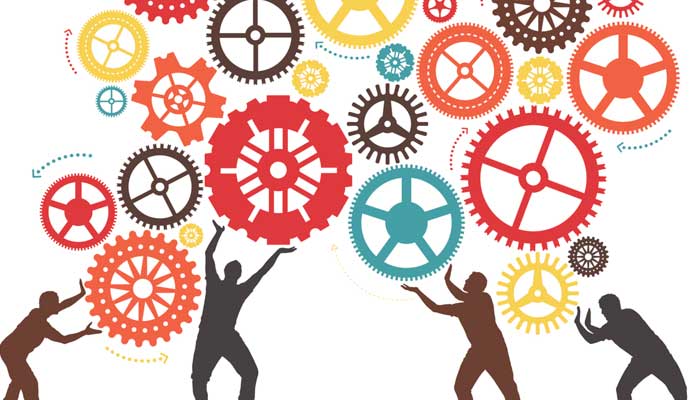Why living your values takes work
Recent brain research shows how you can increase your credibility as a leader.
Most people assume that values are an either/or issue: Good people have them and bad people don’t. Given this view, translating company values into action (a shift in emphasis that I suggested in my last column) should be as simple as hiring the right people and getting rid of the wrong ones. Yet recent brain research shows that all people probably have blind spots they aren’t aware of, which means there are many unexplored opportunities for constructive action — and unrealized ways for leaders to shape their company culture.
Are there leaders in your organization who see themselves as highly values-driven — who talk about integrity, but whose actions contradict their words? Perhaps they promise to communicate but routinely fail to inform others about important changes. Or they demand accountability but throw their staff under the bus when something goes wrong. These leaders must know they aren’t walking their walk and talking their talk, right?
Actually, they might not. And we might not know about the incongruencies in our own actions, either.
Science may help us to avoid this looming credibility gap. I’ve been fascinated by the new research on human nature and the brain that’s been published in the past 10 years. Researchers have shown how bias can influence people’s actions in ways they don’t realize. In addition, behavioral ethicists have found that people will act more or less ethically depending on whether they’re under time pressure, whether they currently feel good about themselves and the values that drive them, or even whether they’re thinking about a luxury product at the time of a decision.
One of the most powerful ideas in this area of research is “bounded ethicality,” which refers to the way in which decisions about how to act can be limited by behavioral shortcuts and external conditions. I recently spoke with Dolly Chugh, a professor at the New York University Stern School of Business, who helped develop the concept and last year published a book on bounded ethicality and bias: The Person You Mean to Be: How Good People Fight Bias. As she explains, “Bounded ethicality is based on the idea of ‘bounded rationality,’ which says that our brains have limited processing power, so a huge percentage of human reasoning happens on an unconscious level. Why would we assume we can operate in a fully conscious mode when making decisions with ethical significance? We’re using the same brain!”
Research on bounded ethicality shows that otherwise good people routinely contradict their own values in ways they may not realize at the time. Through small, unconscious, often rushed decisions, people may do or say something that doesn’t fit who they mean to be — and then move on so quickly they aren’t even aware of it. Employees might bad-mouth a colleague, go along with a racist joke, or inflate the hours on an invoice. In one ongoing study involving thousands of people around the world, the psychology and economics professor Dan Ariely and his colleagues found that 64 percent of participants cheated, but just by a little.
Research shows that otherwise good people routinely contradict their own values in ways they may not realize at the time.
Even with her commitment to inclusion, Chugh frequently catches herself in contradictions. “The other day, my kids told me about a surgeon who visited their school,” she recounted. “I immediately asked, ‘What did he say?’ without stopping to consider that the surgeon could have been a woman.”
Bounded ethicality affects leaders at a company level as well. Leaders often compartmentalize decisions on different topics, so they don’t recognize contradictions. For example, they may launch a reorganization without stopping to think how their company’s stated value of caring might apply to communicating difficult changes. Or they might commit to ambitious corporate social responsibility goals, but not consider all the functions that need to be aligned. Unfortunately, others can interpret these contradictions as signs of bad faith, which can severely damage trust and credibility for individual leaders and the entire company (pdf).
How can leaders apply the concept of bounded ethicality to help them truly live their values and shape their company’s culture for the better? I would start with three priorities.
1. Adopt a growth mind-set to living your personal and corporate values. According to Chugh, if we define a good person as someone who always acts on their values, then finding out about mistakes puts their whole identity at risk. We shut down, tuning out the feedback we need to hear. Who wants to tell a leader who sees himself or herself as one of the “good guys” that he or she is discounting certain voices?
But if we define a good person as someone who continuously grows and improves, then their identities are not threatened by minor lapses. We devote more attention to learning, and we persist longer in our efforts. As a result, we’re more accountable and actually raise ourselves to a higher standard.
2. Shift how you respond to contradictions in others. From the perspective of a fixed mind-set, it’s easy to assume that when people’s actions don’t align with their words, their character is fundamentally flawed. It’s tempting to write them off. But if we know that even well-intended people often contradict their values without realizing it, then we can view that incongruence as a chance to engage.
In these situations, try to find out whether the other person is interested in receiving feedback and learning. If so, you might say, “I know you care about x, and I personally know that it’s a challenge for me to live up to who I mean to be. So when I saw y, it concerned me, because it just doesn’t seem to fit with what I know you care about. I wonder if you were aware that it came across that way?”
3. Shape your company’s systems and shared habits to activate the best in people. Many leaders act on company values in interpersonal workplace interactions but fail to apply them in designing systems, work processes, and shared habits. In these contexts, small “nudges” can have a powerful multiplier effect in bringing out the best in people, at scale. For example, if your firm believes in demonstrating respect for employees, do your systems also support managers in having consistent goal-setting conversations, providing feedback, and noticing wins? That sort of action is what employees look to first. Do you create forums to connect the dots between groups so that you speak and act consistently, as one company? These are all areas where companies can put structures in place that lead to a better alignment between values and day-to-day behavior.
Once we realize that we all have blind spots, then living our values — individually or as a company — becomes a life’s work. Integrity is not a static state. It’s a dynamic commitment to learning, and it requires that leaders understand how their actions, and those of their company, are affecting employees, customers, investors, and the world. In other words, it requires that leaders continually look with fresh eyes for where there is more work to be done.






